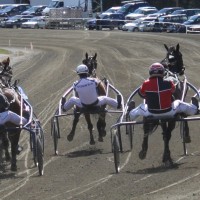Forage-only diet and road transport positive for exercise performance

This study examined how the impact of diet and road transport to competition may affect performance in Standardbred horses. A diet consisting of energy rich haylage was compared to a diet of 50:50 haylage:oats. The same haylage was used for the two diets and bots diets covered the maintenance requirements × 2 and were supplemented with minerals and salt. Race-like exercise tests on an oval racetrack were performed both with 100 km road transport and without road transport.
The two diets implied no difference in body weight or BCS (body condition score) but the horses drank more when fed forage only. The concentration of TPP (total plasma proteins) was lower when the horses ate forage-only, which show that the horses maintained their fluid balance/plasma volume better on the forage-only diet and this has been observed before. Maintenance of plasma volume is probably beneficial when horses are to perform and in this study the horses also maintained their plasma volume better after road transport when they ate forage and no concentrate. In addition the horses had higher concentration of plasma acetate when fed the forage-only diet. This is due to higher production of acetate in the hindgut when horses consume only forage, which stimulates aerobic metabolism to greater extent than a diet including starch (concentrate/cereals).
Road transport before the race-like exercise tests implied higher concentrations of plasma NEFA (nonesterified fatty acids) and glucose which indicates changes in energy metabolism towards increased fat utilization. High concentration of plasma glucose have in earlier studies been associated with increased performance.
When the horses were fed the haylage:oats diet they had after transport higher plasma concentrations of the stress hormone cortisol than when they were fed forage only. The cause of this is not clear, but starch rich diets have been reported to affect horses reactivity, heart rate and handling behaviour.
In conclusion, both the forage-only diet and road transport had positive effects that can be beneficial for horses exercise performance. Important to remember when feeding forage-only diets is that the forage has to cover the horses energy and protein requirements and therefore, especially for athletic horses, it should be harvested early and have high nutritional content. A forage-only diet also needs to be complemented with minerals and salt.
Sara Muhonen, AgrD
